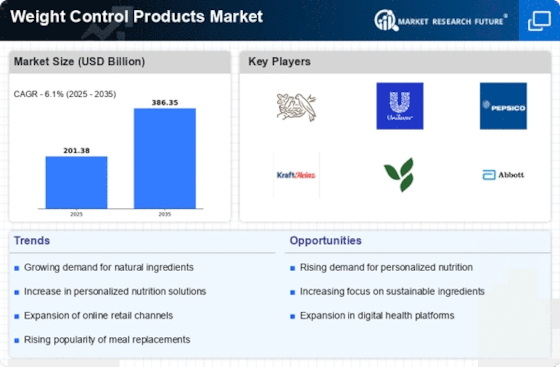Top Industry Leaders in the Weight Control Products Market

The Weight Control Products market, a crucial segment within the global health and wellness industry, is characterized by a competitive landscape influenced by factors such as rising awareness of obesity-related health issues, changing consumer lifestyles, and the demand for effective and safe weight management solutions. As of 2023, key players strategically position themselves in this competitive environment, implementing various strategies to maintain or enhance their market share.
Strategies Adopted:
Key players in the Weight Control Products market deploy a range of strategies to remain competitive. Continuous innovation in product formulations, adherence to evolving nutritional trends, and compliance with regulatory standards are central strategies. Companies invest in research and development to create weight control solutions that address specific health concerns, such as appetite suppression, metabolism support, and overall well-being. Strategic partnerships with fitness experts, nutritionists, and wellness influencers contribute to expanding the market reach and product visibility of weight control products. Marketing efforts often focus on brand trust, emphasizing the efficacy, safety, and convenience of their weight management offerings.
Market Share Analysis:
Market share analysis in the Weight Control Products market is influenced by several factors, including brand reputation, product quality, pricing strategies, and distribution efficiency. Companies with strong brand equity and a reputation for producing high-quality and science-backed weight control products tend to secure a larger market share. Pricing strategies that balance affordability with the perceived value of weight management solutions play a crucial role, given the competition with other health and wellness products and the varying cost sensitivities of consumers. Effective distribution networks, covering both traditional retail channels and e-commerce platforms, are vital for maintaining a competitive edge.
New and Emerging Companies:
While key players dominate the Weight Control Products market, new and emerging companies are entering the sector, often focusing on specific product categories or introducing innovative formulations. These entrants may emphasize unique ingredients, sustainable practices, or target niche markets with specialized weight control solutions, contributing to the overall diversification and innovation in the Weight Control Products market. Although their market share may be relatively modest compared to industry leaders, these companies play a role in driving trends and meeting the evolving demands of consumers seeking personalized and effective weight management options.
Industry Trends:
The Weight Control Products market has witnessed noteworthy industry news and investment trends in 2023. Key players are investing in sustainability initiatives, responding to the growing consumer awareness of environmental impact and responsible sourcing. Collaborations with sustainable agriculture projects, efforts to reduce packaging waste, and initiatives to ensure traceability contribute to maintaining a consistent and responsibly sourced supply of raw materials for weight control product production. Additionally, investments in technology adoption, such as advanced production methods and digital traceability, aim to enhance production efficiency and maintain the quality and efficacy of weight management solutions.
Competitive Scenario:
The overall competitive scenario in the Weight Control Products market is marked by intense rivalry among key players striving to capture a larger share of the growing market. The industry's competitiveness is evident in the emphasis on innovation, sustainability, and strategic collaborations to address evolving consumer preferences and regulatory requirements. The global reach of these companies enables them to adapt to regional dietary habits, capitalize on emerging markets, and navigate complex regulatory landscapes, contributing to the overall dynamism of the industry.
Key Players:
Atkins Nutritionals, Inc (US)
Amway (US)
Kellog Company (US)
Conagra Brands Inc. (US)
Pepsico Inc. (US)
Biosynery
Kraft
Quaker
GlaxoSmithKline
Herbalife International of America
Recent Development in 2023:
Herbalife: Promoting plant-based protein shakes and meal replacements, concentrating on sustainable sourcing and ethical operations.











